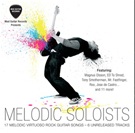The Musical Margin: Why Technique = Musicality
 In order to allow your musical feeling to emerge and give life to the notes you play, you must have the technique required to produce those notes in the first place. “Technique” is the conduit through which musical feeling flows.
In order to allow your musical feeling to emerge and give life to the notes you play, you must have the technique required to produce those notes in the first place. “Technique” is the conduit through which musical feeling flows.
People are often surprised when they learn that I have continued to practice and improve pieces of music that I have played for decades, including pieces I have often performed or recorded. “Don’t you know it by now!?”, they say!
Apparently, they are not aware of the dictum I have laid down in “The Principles of Correct Practice For Guitar” for students to follow if they wish to continue to improve and expand their abilities on guitar, and realize their highest potential as guitarists. It is this: always tell yourself “I don’t know how to play the guitar”. After 40 years of playing, I tell myself every day “I don’t know how to play the guitar”.
Why do I tell myself this? Do I just like to remind myself what a slow learner I am?
No, not really, although I know I have had to work a lot harder to get what others found easy. I tell myself “I don’t know how to play the guitar” so that my mind will constantly be open to new ideas and new intuitions about ways to improve my playing. I tell myself this so that I will not become complacent and stale in my ways of thinking and doing things. I tell myself this so that I will never fall into the common rut of operating from assumptions that have never been reexamined, and have actually outlived their usefulness. Because I tell myself this (and thus keep “Beginners Mind”), I now play light years better than I did at any time in my past.
This is why I counsel my students to think in this way, so that they can be the guitar player they are really capable of being.
What Is “Getting Better” And Do I Have To?
Now, someone may say, “well, do I have to keep getting better, can’t I just stop getting better and enjoy myself? Anyway, what does ” getting better mean?” Those are fair questions.
First of all, of course it is okay if you say “I don’t want to get any better, I am happy where I am and I just want to play my guitar”. That is fine. It is not fine for me, but it may be fine for you. I enjoy getting better and better on guitar, and I have discovered the interesting fact that the better I get at playing guitar, the more I enjoy playing guitar! And since I like to have as much fun as possible in my life, I keep working at getting better on guitar. If you don’t want to get better on guitar, I probably won’t run into you, since my job is to make people better and those are the people that come to Guitar Principles. If you are not looking to get better you probably won’t be reading this anyway, you’ll be busy playing your guitar, at whatever level you play it! How much you are actually enjoying it, though, is another question.
As far as what “getting better” means, it means two things:
1) Becoming able to do things that you could not do before
2) Being able to do things you can already do, but learning to do them much more easily
Both of these possibilities are very exciting for the guitar player who knows how to make “getting better” happen, and both lead to increased joy in playing guitar, and increased musical quality and power for the music we make.
Learning To Do What You Can Not Do
When someone begins to learn guitar, they, by definition, fall into the category of needing to learn to do things they cannot do, because they cannot yet do anything! So they are not ready to sit on their laurels and enjoy the fruit of their accomplishments. They need to set out on an effective path of learning to do what they cannot do. Some do actually learn the necessary new skills and continue on playing guitar, and many don’t, and stop trying.
Many of those that do get up and running as guitar players reach a particular point of ability and stay there. There are things they can do, and there are things they cannot do. This is fine if they do not want to do the things they cannot do. It is a problem if they want to do new things, but find they cannot learn to do them. Then, they go through a cycle that begins with struggle, leads to frustration, and finally resignation. But the frustration is always burning underneath, they feel a resentment that they cannot do what they see other, “better” players doing.
Anyone familiar with “The Principles” knows that the entire goal of my teaching work is to enable any guitar player to learn to do what they cannot yet do, and have not been able to learn to do. We have that one covered. We have saved thousands of guitar players who could not even get to first base with guitar from the horrible fate of continuing to live without being able to play the guitar. Because of “The Principles”, no one need any longer suffer silently with the torture of unrequited guitar love!
So, let us turn our attention to the other aspect of “getting better”, which is learning to do the things we can do already, but learning to do them more easily. Why is that important?
Learning To Do Things More Easily
I once saw a video of the legendary classical guitarist John Williams talking about practicing guitar. He remarked that guitar players needed to learn to enjoy practice and to understand what it is. He said “practicing is sitting with your guitar and saying “now how can I find an easier way to do this”. This statement contains a great truth, but unfortunately, for many players that truth will be useless, because they simply do not know how to make anything easier. Like most great truths spoken by great players you have to actually be in the same place they are in before you can see the truth of what they say.
Knowing how to make things easier is what all of my teaching work is about. I show you step by step how to do everything in the best possible way, and in a way that does not prevent continued development. “Skill” is the ability to reconcile opposing dynamics. When we can do something easily, it is because we have found a way to balance the opposing forces that must be applied to the guitar strings in a way that does not create excessive and uncontrolled muscle tension. When we struggle to play, we are suffering from this muscle tension during playing that is resulting from movements that do not apply force to the strings in precisely the correct way. This is always true.
When we are struggling to play, and our body is constantly tensed while trying to make the movements that will make the notes (and there are many, many players in this state even though they are only dimly aware of it) everything that makes music so wonderful begins to degrade. Our rhythm and smoothness in playing, our tone, even the notes themselves begin to be only a pale reflection of what they could and should be. It is no fun for either player or listener.
Now that we have looked at the “what” of playing easily, let’s look at the “why”.
The reason we should always strive to find easier ways of doing things on guitar is quite simple: the easier something is to do, the more our musical feeling can be poured into the music we make. The more developed, ergonomic and optimized our technique is, the wider the pipeline though which musical feeling can be poured. We must still supply the musical feeling, but it is amazing how much easier it is to feel the music once the physical body is relaxed, comfortable and actually feeling pleasure in its movements to play, and the mind is concomitantly composed, quiet, and able to simply be aware, listen to and enjoy the music even as it creates it in each moment.
The easier something is to do, the more our musical feeling can be poured into the music we make.
Understanding this vital relationship between musicality and technique is extremely important. People often argue about which one is more “important”, musicality or technique. That is an absurd question, it is like asking which is more important, the chicken or the egg! One gives rise to the other, and each is the “reason” for the existence of the other. Technique is needed so that we can make the music, and without the music we would never need technique. In fact, they are two sides of the same coin, and I don’t think we would ask “which is more “important”, heads or tails? (unless maybe we bet on heads!).
The desire to express our musical feeling demands the need for technique with which to do that. The more refined our technique, the more refined our musical feeling is allowed to be. The size of the pipe through which our musical feeling can flow depends on the ease with which we perform the movement process called “playing the guitar”. I call this pipeline our “musical margin”. As we learn to continually surrender ourselves to the music, and increasingly intensify our emotional involvement with the dimension of “sound with meaning” that we call music I believe that we, as players, should be in continual search of widening our musical margin. There should always be as much room and freedom for the flow of musical feeling as possible, but when we struggle to play, the flow of feeling is strangled.
There is an direct relationship between technique and feeling in making music, the more there is of one, the more there can be of the other. We must keep in mind, however, that not all music is equal in its demands for technique. Some things are simply easier to do than other things, and some styles are more demanding of technique than others. People’s attitudes about technique are often fashioned by the particular style they play. The basic rule of thumb is to acquire the technique you need to give life, not death, to the music you wish to play.
One other important benefit of learning to do things more easily is that it increases our consistency during playing. Every one who performs or records has had the experience of having things go really well in the practice room and fall apart on the stage or in front of the mic! We usually blame “chance” or any number of indeterminate factors for our playing breakdowns. The fact is that these breakdowns have a technical basis. Sure, on a good day when no one is watching we might make the notes 3 times out of 5. But when the pressure is on, the power of every technical weakness is magnified a hundred times. As we learn to do things in better and better ways, using less effort and causing less tension, it is amazing how solid our playing becomes!
Hearing The Music
Another interesting fact is that the easier it is for us to make the music, the more we are able to actually hear the music as we make it. And the more we hear the music we make, the more we feel the music we make. As I have improved my playing over 40 years, I have seen the notes themselves sink deeper and deeper into my bones. Every note is more alive, more vibrant, and carries more meaning to my inner ear. For the listener, who is on the other end of the notes I play, their experience with the music I make is primarily dependent on the experience I am having with the music I make.
This intensification of the musical experience is the primary reason for continuing to widen our musical margin. For those who desire to do so, it is an endless and ever deepening process. When you do it for a long time, you become known as someone who is “great” on guitar. All great players have a wide musical margin. All struggling players have a narrow musical margin. All “non-starters” on guitar have no musical margin, they have no ability to feel the music – because they cannot make music to begin with.
This is the situation of a player who wrote to me recently, wanting to know how to “feel” the music more………..
Hi Jamie
I want to know how I can play the guitar with more expression. My problem is that I can read and play the notes in the song but for some reason I can’t give the music the expression and passion needed to make a good performance. How can I overcome this brick wall ? My professor tells me that I have the passion inside but I need to let it out. For some reason it hasn’t happened yet. I am very frustrated, I hope you can help me.
Thank you Jamie!!
Ed
I have never met this person, but I have met hundreds of students over the years who say the same things when they first come to me. In all these hundreds of cases I have seen one thing, and one thing only: there is no musical feeling because the person is struggling to play and does not know how to make the music without struggling. Many times, the person was studying with a teacher, often at the university level, and the teacher could do nothing to improve the situation either. I have no doubt this is the case here as well.
For those who wish to widen their musical margin, no matter where you are right now, Guitar Principles is the way to the deeper experience of making music you are seeking.
Copyright 2011 Jamie Andreas. All rights reserved. Used by permission.
Get solid results from your guitar practice….learn how to practice correctly!
Visit www.guitarprinciples.com










